Rick Perry’s Wrongheaded “Government Reform” Plan
Rick Perry is out with a plan to reform Washington. Mostly, it's just a bunch of gimmicks.
Rick Perry’s latest effort to reboot his campaign involves a far-reaching, ultimately quixotic, government reform plan that essentially calls for a complete reworking of how the Federal Government works:
BETTENDORF, Iowa — Gov. Rick Perry of Texas on Tuesday announced a proposal to alter the federal government that ranks among the most radical plans offered by any major Republican presidential candidate this year — and one that legal analysts say will almost surely never happen: making Congress operate part time with half pay, and ending lifetime tenure for federal judges.
“I don’t believe that Washington needs a new coat of paint — I think the whole place needs to be overhauled,” said Mr. Perry, speaking to applause from more than 100 people on the floor of the Schebler manufacturing plant here. “I’m a true believer that we need to uproot, tear down and rebuild Washington, D.C., and our federal institutions.”
Mr. Perry, who is trying to reboot a campaign that is lagging in the polls, proposed cutting the pay of Congress in half (or by three-fourths, under one proposal he sketched out) and halving both its budget and the time members spend in Washington.
“We have a lot of well-intentioned members of Congress, but they have become creatures of Washington,” Mr. Perry said. “They get paid more than three times the average American family, and they have doubled their own budgets in the last decade.”
Mr. Perry also vowed to “reform” the federal judiciary. “Too many federal judges rule with impunity from the bench,” he said, “and those who legislate from the bench should not be entitled to lifetime abuse of their judicial authority.” He proposed 18-year terms, staggered every two years, for new Supreme Court justices, and suggested similar limits on federal appellate and district court judges.
In the speech, Mr. Perry sought to present himself as a consummate Washington outsider. He reminded the audience that he was one of the few Republican candidates who had never worked as a lobbyist, served as a member of Congress or spent time in a presidential administration.
“I’m unique to the Republican field,” Mr. Perry said. “I have never been an establishment figure. I’ve never served in Congress. I’ve never been in an administration. I’ve never been a paid lobbyist. My career has been that of a Washington outsider.”
The speech, which Mr. Perry referred to as his plan to “uproot and overhaul Washington,” was an effort to try to return to issues after an embarrassing stumble at a presidential debate last week raised new questions about his candidacy. He did not make a joke — as he did in Saturday’s debate in South Carolina — about forgetting the Department of Energy as one of three agencies he would like to eliminate.
Here’s a basic summary of what Perry is proposing:
- Ending the practice of giving lifetime appointments to federal judges (current judges would not be affected);
- Cutting Congressional pay in half;
- Cutting Congressional pay in half again if they don’t balance the budget by 2020;
- Cutting Congressional office budgets in half;
- Cutting the Congressional calendar by half;
- Criminalizing insider trading by Congressmen;
- Reducing spending to 18% of GDP;
- Privatizing Fannie & Freddie;
- Ending the funding of Planned Parenthood;
- Eliminating the Commerce, Education, and Energy Departments;
- Getting the EPA under control;
- Getting the TSA under control;
- Audit the government, including the Department of Defense;
- Freeze incoming federal regulations, and audit all of them for the last five years;
- Federal salary freeze for all non-military and non-law enforcement officials until the budget is balanced;
- And cutting the Presidential salary in half until the budget is balanced
Some of these ideas are quite banal, really. What exactly does it mean to say you want to get the EPA and TSA “under control”? How, specifically, are you going to cut Federal spending enough so that it’s equal to or less than 18% of GDP? The audit idea reminds me of the Grace Commission from the 1980s and the mostly useless idea of attacking “government waste.” I’ve written more than once already about Perry’s odd ideas for the Federal Judiciary (here, here and here). It’s also worth noting that a few of these provisions would require Constitutional Amendments, and the idea that it’s going to be easy to amend the Constitution is just silly.The part of Perry’s proposals that are getting the most attention, however, are his ideas to basically create a part-time Congress, and it’s an idea that’s getting criticism from both sides of the political aisle.
Matthew Yglesias describes Perry’s plan with one word, terrible:
The basic problem is that under modern conditions, de-professionalizing a legislature tends to make it more corrupt and less responsive to either the views or objective interests of the public.
You can see this along a number of dimensions. One is that if members of Congress need to work second jobs, their business relationships will involve conflicts of interest. A second is that to the extent that earning extra income takes up more of members of Congress’ time, they’ll become more dependent on lobbyists and special interest groups for information and assistance with their projects. A third is that lower pay tends to induce legislators to retire sooner, and less-senior legislators are more dependent on lobbyists and special interest groups for information and assistance with their projects. A fourth is that to the extent you cut legislators’ pay, a larger share of the real compensation for doing legislative work is the opportunity to “cash in” after you leave office. A fifth and related consideration is that to the extent you cut legislators’ pay, a larger share of the real compensation for doing legislative work is the ability to raise PAC and campaign funds that you spend on yourself. Last, but by no means least, to the extent that you reduce the desirability of winning re-election, you encourage members of the legislature to ignore their constituents in favor of pleasing others.
The response to this argument, of course, is the idea that increasing rotation in Congress returns us to the ideal that the Founders had when the first drafted the Constitution, the idea of the citizen legislator. Now there’s nothing wrong with this idea in principle. For one thing, the idea that Congress is so heavily dominated by the legal profession strikes me as as a bad thing because it reduces the perspectives that are available to members. It’s a good thing, I think, that we get business owners, entrepreneurs, and maybe even a few ordinary people in there if they can convince people to elect them. Of course, that ideal hasn’t existed for a long time, if it ever did, and there are now plenty of people in Washington for whom their sole career for decades has been being a Member of Congress or a Senator.
But Perry isn’t just talking about a more diverse Congress, he’s talking about a Congress that does less work for less money, and there’s more than a few problems with that idea.
On the money side of the equation, Matt Glassman points out that, adjusted for inflation, the Members of the 112th Congresss are not making all that much more than their predecessors in the 63rd Congress, which ran from 1913-1915. Glassman’s chart tells the tale:
John Sides makes another point about the impact that a Congressional pay cut as drastic as the one Perry proposes would have:
The broader problem with Perry’s proposal, as Kevin Collins noted, is that “de-professionalizing” the legislature by cutting pay and the like would actually make Congress less responsive to voters. He cites this paper (pdf) by Jeffrey Lax and Justin Phillips. In it, they find that the congruence between state policy and voters’ opinions is stronger in states with professionalized legislatures—where professionalism is captured by legislators’ salaries, the number of days the legislature is in session, and the number of staff assigned to legislators.
In short, if you want public policy to reflect popular will, don’t stock the legislature with amateurs.
There’s another argument about Perry’s plan that I think is actually more important, though, because it involves the enhancement of the power of a Presidency that has already grown far beyond where the Founders ever intended:
One of the key levers of power for Roosevelt’s New Deal and, more broadly, the modern presidency is its corps of bureaucrats and analysts; the Executive Office alone has at least 2000 or so staffers. The president has access to layers and layers of information. This access gives the president great influence in shaping the annual budget and the details of policy. Members of Congress may propose laws, but the substance of these laws often has considerable White House backing.
Congressional staff provide at least a partial check on the data power of the executive branch. By undermining Congressional staffs through salary cuts, one also undermines the ability of Congress to shape the information narrative and write legislation. Meanwhile, cutting Congressional pay might seem an invitation to more petty corruption.
(…)
Any talk of cutting government employment may elicit shouts of glee from many on the right. But conservatives need to ask themselves whether it advances the cause of smaller government to reform the federal government so that the centralized executive branch has even more power.
Indeed.
The truth of the matter is that cutting Congressional pay and reducing Congressional staff is going to do very little to bring Federal spending under control. As noted above, it’s also not likely to make the legislative branch more responsive to the public. While the “citizen legislator” idea is an appealing one, the truth of the matter is that a Congress filled with inexperienced legislators working for half of what their predecessors a century ago did isn’t going to improve Congress. In fact, it’s likely to make Congress worse and the President more powerful. In fact, a suspicious person would say that Perry is proposing something like this because he knows it would increase the power of the office he’s seeking. In reality, though, much like Perry’s own chances to win the Republican nomination, there’s very little chance any of these ideas would ever see the light of day. To the extent Perry intended to propose a real plan, he failed here. Instead, all we’ve got are gimmicks.
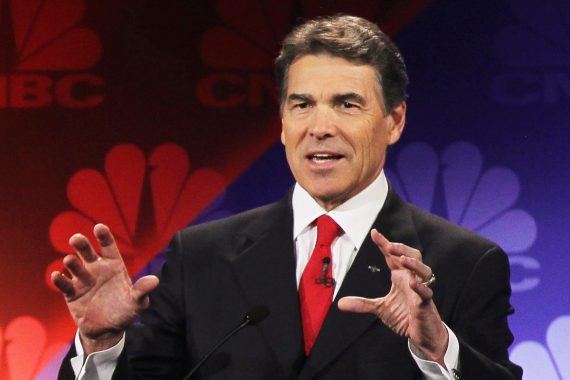


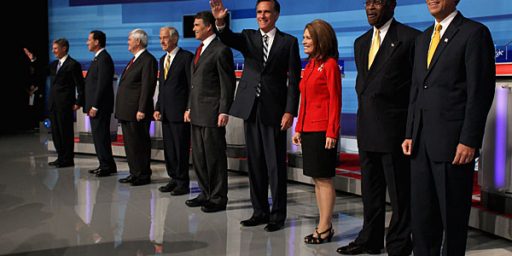
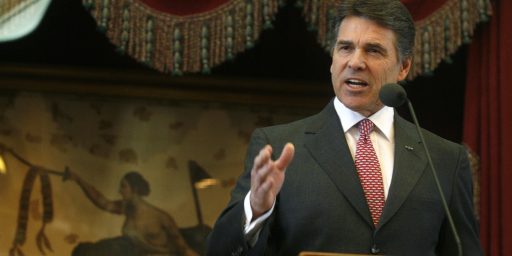
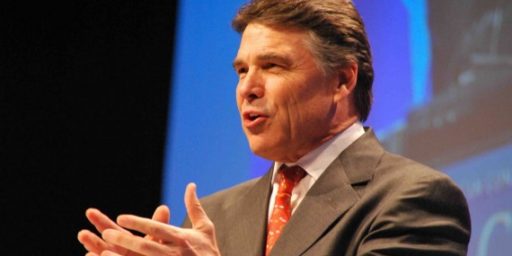

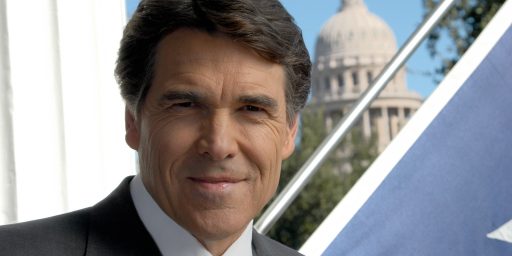
The word isn’t “terrible”, it’s “joke”. The vast majority of things he’s proposing aren’t under the control of the President at all, and some (like the changes in the Judiciary and linking future Congressional pay to the budget) probably require a Constitutional amendment. This is nothing more than a campaign on the down-slope flinging red meat to the masses, desperately hoping someone will stop chasing today’s “front-runner” long enough to care that Perry was once a front-runner too…
How condescending. Does he really think the the majority of Americans are this stupid to believe he could be the one conquering hero to change Washington, or even wants to?
But it works in Texas! /snark
Supporters of the leviathan are not going to like Perry’s plan.
legion, Perry obviously plans to change those things under the president’s domain and work with congress and the American people for everything else. He does not claim he will do everything listed on his own.
Ron Beasley, yes, it does work in Texas. Limited government can work everywhere it’s tried.
“The basic problem is that under modern conditions, de-professionalizing a legislature tends to make it more corrupt and less responsive to either the views or objective interests of the public.”
The professional congress we have now is far from corruption and very responsive to the public instead of special interests. Does he really believe status quo works?
The arguments this blog entry makes for big government earn it the title “Inside the Beltway.” They’re going to love this article.
It has got to be better then class warfare, quartera$$ed socialism, and heards of zombies wandering the streets!
@Barb Hartwell:
Yes, he does.
And I think the jury is still out on whether he is right.
Well, getting the EPA under control would at a minimum get them to a rational, predictable regulatory scheme rather than the seemingly random idea of the day they use now. I have a friend who works for one of the biggest chemical companies. Their production is maxed out in the US supplying China. They are building plants overseas to meet this demand but never considered expanding in the US since they have no idea whether they could meet the schizophrenic rules the EPA continuously changes.
Either we get the regulators under control, or quite whining about all the jobs going overseas.
Rational regulation has benefits for all but right now, the purpose of the regulators seems to be to ensure as few enterprises as possible can execute operations in the US. This link is about California but the feddies are becoming just as bad.
Just so happens today Uncommon Knowledge with Paul Rahe discusses the usurpation of the Constitution by the administrative state. Give it a listen.
@Kyle Miller:
I’m not sure I’d call the highest percentage of people without health insurance in the nation a success. Seems to me that’s quite the monumental failure there, pretty much makes any other claim about Texas pointless.
Um….if he gets rid of the Commerce Department, does that mean he wants to get rid of the US Patent and Trademark office?
Has Perry even looked at what the departments he wants to get rid of DO?!!
I guess Kyle and G.A. Miller above don’t want us to have patents and trademarks either. And you want to have a first class economy based on science and engineering, but you don’t want intellectual property. Riiiiight…..
This is more of the same thing we’ve been watching for weeks: the slow-motion collision between talk radio/Tea Party drivel and reality.
It’s good that he put the insider trading ban in there. That is actually bigger than mere pay.
Of course, there are still ways to funnel from PACs to pockets, aren’t there?
@JKB:
What, Tom Friedman’s wise cabbiie was unavailable to serve as your oracle of wisdom?
@JKB:
Yeah, regulation bad! http://en.wikipedia.org/wiki/Bhopal_disaster
@JKB:
The EPA’s powers have been expanded, under Obama, beyond just the Clean Air Act to include the unsettled science of green house gases. So, in effect, it gives the EPA carte blanche over it’s regulatory controls, to issue restrictions in which there hasn’t even been a format created to comply with said restrictions, for some companies. However, when it comes to CO2, carbon emissions there is no sense or sensibility possible in the EPA’s mentality…or, for that matter within the social progressives’ agenda, in being able to even consider other reasons/possibilities for climate change, other than the ones that have been stapled in their brains by some of the flawed studies done by the IPCC.
@jan: Link to the flawed studies and “unsettled science” please?
@David M:
‘Busy work’ ……….
This…..
Carbon modeler says its a scam
The new hockey stick
Cern cloud cosmic ray first results
Then, literally a directory of various articles either disputing the science, or at least calling it into question.
http://www.akdart.com/warming5.html
Frum’s question is a no-brainer–the answer to his question is yes, a centralized GOP executive branch with greater advances the goal of smaller government, while a centeralized Democrat centralized government with greater power retards the goal of smaller government.,
Isn’t the point of the debate about the size of the government that Republican governments of the same size are, axiomatically, smaller than Democratic governments, or have I been missing some detail as the size of government grew over the past three decades no matter who was in power?
@michael reynolds:
Your reading comprehension needs work. What about ‘rational regulation’ don’t you understand?
Not to mention, Bophal is in India. I fail to see how that has anything to do with EPA regulations.
@jan:
Don’t bother. They put their hopes and dreams on using CO2 to achieve their agenda. The very fact they still bring this up in the face of the ever increasing evidence by real scientists who can do real math using properly placed measuring equipment shows their devotion.
But pay no attention to the big bright ball of heat and light in the sky.
If CO2 emissions aren’t a problem, great. I’d LOVE to believe that. That would be great. Then we wouldn’t have to worry about it anymore.
But, because the vast majority of skilled people studying the issue thing it is a problem, we should probably do something about it.
Has it ever occurred to you that there is FAR greater incentive for people to disbelieve AGW than for them to believe? None of us really *wants* to change our lifestyles, pay more money for products, etc. It’s much, much nicer to wish the problem away.
The usual RW charge is that the “alarmist” scientist are on the take, which is yet another case of hilarious RW projection. Many of the “skeptics” are connected to industries that have strong financial incentives to ignore the problem. Not all, of course.
Skepticism, itself, is a good thing. I, for one, hope the AGW skeptics are right, even though I think that’s highly unlikely.
This forecast comes from astrophysicist Dr Habibullo Abdussamatov
Whaddya?! Some kinda commie!?
😉
To be more serious about the “it’s the Sun!” argument: last I read up on this, the issue has been raised, considered, and found wanting by most climate scientists.
I’m not a climate scientist, so I don’t know if they’re right or not. Neither do you, btw.
@David M: That’s if you believe health insurance really is a good thing. Considering that it obscures the cost of health care from the one who actually consumes it, thus leading to third party payer problems and the ability of doctors and HMOs to run up costs because no one is really shopping around, I don’t.
@grumpy realist: I’m sure you could move part of the departments out of them, and either make them independent agencies or put them under another department. They did that when they created the Department of Homeland Security (which is something Perry doesn’t go far enough on; that monstrosity should just be abolished). I don’t see why they couldn’t make the Patents & Trademark Office an independent agency.
And if you took on the DHS, you might just find significant Democratic (certainly liberal!) support.
If, instead of just saying “Department of Energy – get rid of it!” you said something more reasonable, like “The DoE shouldn’t do X” or “I’d cut XYZ and from the DoE and fold the rest into other agencies” one might be able to have a discussion and find out if there is common ground.
Anyway, regarding other items on the list:
Congressional Pay: meh. Just index the thing to inflation or something (another option would be to index it to a measurement of median US wages).
Spending to 18% of GDP. This is basically just a wish. 18% good, 18.1% bad? Eh. I understand the basic premise – the feds have typically spend about 18-19% in the modern era. If he’s proposing a hard cap, that’s just dumb. Shit happens. Also, since I want a “single-payer” healthcare system, my ideal is north of 18%. YMMV.
Insider trading ban: love it, if feasible. I’d also love to see a workable proposal to curtail the “revolving door,” which I consider to be more of a problem than campaign finance.
Fannie & Freddie: agree.
Planned Parenthood: disagree. Also, sideshow.
Audit the gummint: ok, but don’t we already do that in some way? GAO?
Regulation freeze: typical boilerplate “regulations are evil” thinking. No. Regulation is necessary. The question is whether a given regulation is doing what it should, and whether whatever costs it imposes are worth it. That’s a case-by-case sort of thing. What does he mean by auditing regs? Doing a cost-benefit analysis? Ok, in principle, but I have little confidence that a GOP-run audit would adequately consider the costs of replealing/watering down regs.
EPA: Apparently this is about CO2. The EPA does a lot of other stuff, of course, and the Conservatives usually hate all that too. Suffice it to say that I take threats to our environment (key word: OUR) more seriously than the average joe. I see, in my work, the costs of sweeping the damange under the rug. The costs are real, and kicking them down the road doesn’t make them go away. As for CO2 – I’m sick of arguing about it. I’m inclined to trust the overwhelming majority of scientists on the issue, even though I recognize they could be wrong.
Federal salary freeze (extension of Obama policy): meh. Gotta love the exemption for groups the GOP deems friendly. I don’t think federal pay is a big problem, and I’d worry about attracting less talent. I also figure that for the GOP, that’s a feature, not a bug.
POTUS pay: see Congressional pay.
@Rob in CT:
……and, for the most part, I agree, as do a plethora of other skeptics (which is why these people are called skeptics), that being open to other possibilities is a ‘good thing.’ However, the left is operating under the assumption of a ‘proven’ theory, without any cracks of doubt being attached to their views towards the causes of climate change being solely rooted in CO2. Hence we are having regulatory policies being railroaded through, via the EPA, which are cramping, if not entirely extinguishing, some areas of our manufacturing sector, at a time when we are attempting to jumpstart our economy and discourage any more business from leapfrogging to other more business-friendly countries. In other words, it seems we are committing fiscal suicide based on a science that is still very much in flux as to an affirmed conclusion.
@jan: I’ll note you linked to PowerLine, a political blog and to the CERN study the authors say shows nothing about climate change. Your “directory” refers to climategate, which we now know was a fake scandal manufactured by the right wingers. So those are abvious garbage, and only a fool or someone asking to be deceived would take any of those sources seriously.
Your other two links are almost scientific arguments, although the authors are not climate scientists. Your “carbon modeler” was wrong on many counts, and the “cycles” link is to another popular misunderstanding.
So to sum up the links in order:
1. popular myth
2. bad science
3. political tools
4. unrelated to climate change
5. complete hacks
Well that’s standard Jan. That’s all it does. It goes to RW hack sites, it copies, it comes here, it pastes.
So what’s new?